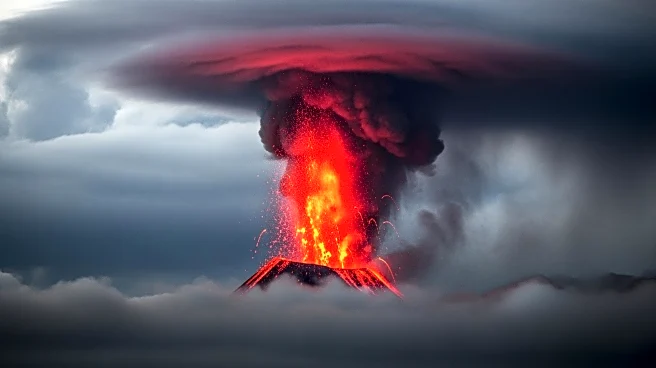What's Happening?
Mount Lewotobi Laki Laki in Indonesia erupted on Wednesday, sending ash over 30,000 feet into the sky. The eruption led authorities to raise the alert level to its highest, prompting the evacuation of residents from nearby villages. The volcano, located
in East Nusa Tenggara province, erupted twice on Wednesday, with the first eruption lasting nine minutes and the second spewing ash 26,000 feet high. The local disaster mitigation agency reported that dozens of people were evacuated, many of whom had previously left their homes following a major eruption in November 2024 that resulted in 10 fatalities and significant property damage. The government has temporarily closed the Fransiskus Xaverius Seda airport due to the volcanic activity.
Why It's Important?
The eruption of Mount Lewotobi Laki Laki highlights the ongoing challenges faced by Indonesia, a country with over 120 active volcanoes situated on the Pacific 'Ring of Fire.' The frequent volcanic activity poses risks to local communities, infrastructure, and air travel. The closure of the airport and potential disruptions to flights underscore the economic impact of such natural events. The evacuation efforts reflect the importance of disaster preparedness and response in minimizing casualties and property damage. The situation also emphasizes the need for continuous monitoring and research to better predict volcanic activities and mitigate their effects.
What's Next?
Authorities are closely monitoring the volcano for further activity and have advised residents to remain vigilant, especially regarding potential volcanic mudflows if heavy rain occurs. The government may extend airport closures and implement additional safety measures as needed. Local communities and disaster response teams are likely to continue evacuation and relief efforts to ensure the safety of affected residents. The situation may prompt discussions on improving volcanic monitoring systems and enhancing community preparedness for future eruptions.
Beyond the Headlines
The eruption serves as a reminder of the broader environmental and geological challenges faced by countries located on tectonic plate boundaries. It raises questions about the long-term sustainability of living in high-risk areas and the balance between economic development and environmental safety. The event may also influence international cooperation in disaster management and scientific research on volcanic activity.
















